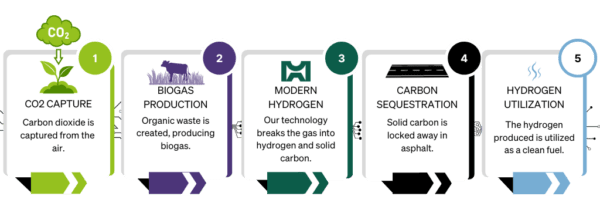It is key to understand the potential uses of hydrogen as it continues to gain recognition as a clean and versatile fuel with a wide range of applications. As we strive towards a decarbonized future, hydrogen offers numerous benefits as a sustainable low-emissions alternative.
Hydrogen is an important clean fuel and serves a number of different uses in different industries.
Why is Hydrogen Important as a Future Clean Fuel?
Hydrogen plays a crucial role in our transition to a clean energy future. It is a rapidly growing alternative fuel source that has the potential to combat climate change, reduce carbon emissions, and promote sustainable development. According to RMI, turquoise hydrogen, “could offer a decarbonization pathway.”
Other hydrogen colors have the potential to drive the energy transition towards lower carbon intensity and sustainable options as well. Green hydrogen, made from renewable electricity, is similarly interesting, but it unfortunately suffers from critical lack of capacity from both renewable power generation and electrical transmission.
Another critical factor in assessing the cleanliness of a hydrogen fuel source is understanding the CO2 emissions associated with transportation and storage. The ability to generate hydrogen on-site where it is needed. Distributed hydrogen offers a method to reduce the carbon emissions from sectors that are difficult to decarbonize. With continued development, distributed hydrogen can contribute significantly to carbon reduction goals without the logistics risks of truck delivery, and without the time delays and expense of building new infrastructure.
The Uses of Hydrogen: Advantages as a Fuel
One of the key advantages of hydrogen is its high energy content. It has a much higher energy density compared to traditional fossil fuels. Additionally, hydrogen fuel cells produce electricity with high efficiency, which can be utilized for a variety of applications.
Experts highlight the potential significance of fuel cells as one of the highest value use cases for hydrogen in resolving one of our most difficult to decarbonize sectors (heavy duty, high-uptime transportation). Hydrogen as a fuel for fuel cells and for engines could unlock sustainable energy that benefits the environment and public health as well as national energy security.
Hydrogen for Electricity Generation
Using hydrogen in fuel cells for electricity generation offers a clean, resilient, and dispatchable alternative to both renewables and traditional gas/coal-fired power generation . According to this report on the uses of hydrogen and fuel cell technologies by the U.S. Department of Energy:
“Fuel cells directly convert the chemical energy in hydrogen to electricity, with pure water and potentially useful heat as the only byproducts. Hydrogen-powered fuel cells are not only pollution-free, but they can also have more than two times the efficiency of traditional combustion technologies.”
This process provides a sustainable solution for efficient power generation with minimal environmental impact.
Green and Renewable Hydrogen: How it Works
Green and renewable hydrogen production methods are gaining traction due to their lower carbon emissions. The U.S. Department of Energy’s Alternative Fuels Data Center explains that green hydrogen is produced through the process of electrolysis using renewable energy sources like wind or solar power. This results in the creation of hydrogen with minimal environmental impact and the potential for a sustainable energy future.

Hydrogen can also be produced from renewable natural gas (RNG). According to the Environmental Protection Agency (EPA), RNG “is a renewable energy source that, when used, can reduce methane emissions, and provide other environmental benefits. Derived from organic waste matter, RNG can be used as a substitute for natural gas and has many end uses.”
The EPA explains that RNG, “can be produced from the degradation of manure and organic matter in an anaerobic digestion system. RNG is different than fossil-based natural gas because it comes from renewable sources.”
Challenges and Brakes to Speeding Up Uses of Hydrogen for Clean Energy
While hydrogen offers numerous benefits, there are challenges to widespread adoption. The clean energy transition faces obstacles in scaling up hydrogen production, distribution, and storage infrastructure.
Research and consulting firm Boston Consulting Group (BCG) emphasizes the importance of overcoming these challenges to accelerate the integration of hydrogen into our clean energy systems. “The hype level is high, and many technological, economic, and policy challenges remain… If hydrogen is to achieve its full potential, it must become less expensive and more efficient to produce, distribute, and use.”
Comparing Various Methods of Producing Hydrogen Gas
To gain a comprehensive understanding of the uses of hydrogen and hydrogen’s potential, it is essential to compare the various methods of hydrogen production. Conventional methods like steam methane reforming are extremely polluting, but cheap and widely available. Emerging technologies such as methane pyrolysis, electrolysis and biogas as feedstock are crucial to consider.
There are many uses of hydrogen that present enormous opportunities for a cleaner and more sustainable energy future. Its numerous advantages as a fuel and its versatility in various industries make hydrogen a promising solution for decarbonization.
With ongoing advancements in technology and concerted efforts towards low CO2 emissions from production through point of use, hydrogen is poised to play a pivotal role in our transition to a clean energy economy.

